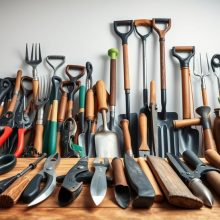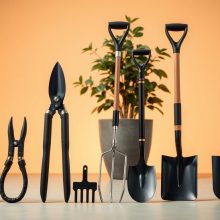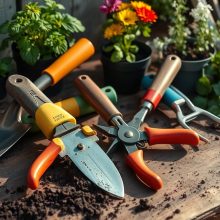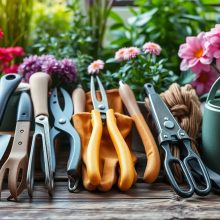Essential Gardening Tools: A Complete Guide for Beginners
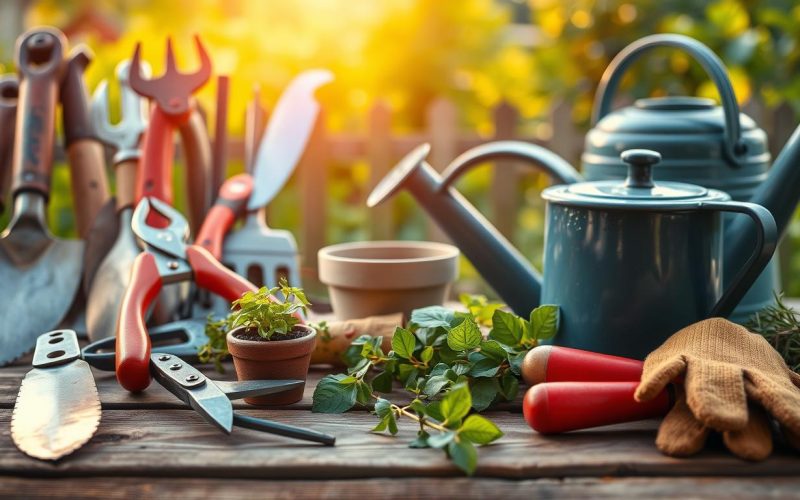
Gardening turns outdoor spaces into lively gardens. Choosing the right tools is key to success. Whether you’re new or experienced, the right tools are vital for a beautiful garden.
Knowing the basics of garden tools boosts confidence for beginners. Good tools make tasks easier and keep plants healthy. From simple hand tools to power equipment, the right tools enhance your gardening.
This guide will help you pick the best gardening tools for your needs. We’ll cover different tools, their uses, and how to choose the right ones for your garden.
Key Takeaways
- Quality tools are essential for successful gardening
- Different garden sizes require specific tool selections
- Investing in versatile gardening tools saves time and effort
- Proper tool maintenance extends equipment lifespan
- Beginners can start with basic hand tools and expand their collection
Understanding the Importance of Gardening Tools
Gardening is more than just planting seeds and watering plants. The right tools can make your outdoor time enjoyable. Both professional gardeners and weekend hobbyists know that good tools are key to a successful garden.
Choosing the right tools matters for your comfort and the health of your garden. Landscaping tools are not just extras. They are important investments that help you succeed in gardening.
Benefits of Using the Right Tools
Using the right tools has many benefits. Here are some:
- Less physical strain during gardening
- More efficient plant care
- Safe handling of delicate plants
- Less risk of injury
- Long-term savings due to durability
How Tools Impact Gardening Efficiency
Good gardening tools can really boost your productivity. A well-made trowel or pruning shear makes work faster and more precise. Professional tools help you do tasks easily and keep plants healthy.
By choosing the right tools, you save time, avoid exhaustion, and get better results in your garden.
Types of Essential Gardening Tools
Gardening success comes from having the right tools for each job. Knowing the different types of tools helps gardeners work better and care for their plants well.
The world of gardening tools is divided into three main groups: hand tools, power tools, and specialty tools. Each group has its own role in gardening and plant care.
Hand Tools: The Gardener’s Foundation
Hand tools are the heart of any gardening kit. They help gardeners do precise tasks with little effort.
- Trowels for digging and transplanting
- Pruning shears for trimming
- Hand rakes for soil preparation
- Weeding tools for removing unwanted plants
Power Tools: Efficiency for Larger Gardens
Power tools make gardening faster and easier. They are great for big gardens or tough landscaping jobs.
- Electric tillers for soil preparation
- Hedge trimmers for landscape shaping
- Leaf blowers for yard cleanup
- Cordless lawn trimmers
Specialty Tools: Precision for Specific Needs
Specialty tools solve unique gardening problems. They offer specific solutions for certain plant care needs.
- Soil moisture meters
- Specialized pruning tools
- Garden forks for soil aeration
- Disease and pest diagnostic tools
Choosing the right tools can make gardening fun and rewarding.
Must-Have Hand Tools for Every Gardener
Outdoor gardening tools are key to a successful garden. They are vital for both new and seasoned gardeners. The right tools make gardening easier and more fun.
Having the right hand tools makes gardening more efficient. They help avoid strain and allow for precise work. Whether you have a small garden or a big backyard, these tools are essential.
Trowel: The Versatile Tool
A trowel is the most versatile garden tool. It helps with many tasks:
- Digging small holes for planting
- Transplanting seedlings
- Removing weeds
- Mixing soil amendments
Pruning Shears: Keeping Plants Healthy
Pruning shears are key for plant health and looks. They let gardeners:
- Remove dead or diseased branches
- Shape shrubs and small trees
- Encourage healthy plant growth
- Prevent plant diseases
Hand Rake: For Soil Preparation
A hand rake is crucial for garden care. It’s great for working with delicate soil, including:
- Smoothing soil surfaces
- Breaking up small soil clumps
- Collecting leaves and small debris
- Preparing seed beds
Quality hand tools improve your gardening. They help you get better results in your garden.
Essential Power Tools for Larger Gardens
Big gardens need special tools for upkeep. Power tools make garden care faster and easier. They help gardeners work on large areas quickly and accurately.
Large gardens need strong tools to make care easier. The right power tools save time and effort. They make gardening less tiring and more productive.
Electric Tillers: Saving Time and Effort
Electric tillers are a big help for big gardens. They quickly mix up the soil. This makes garden beds ready with little effort.
- Rapid soil preparation
- Less physical strain compared to manual digging
- Consistent soil texture
- Ideal for medium to large garden spaces
Hedge Trimmers: Neat and Tidy Hedges
Modern hedge trimmers make tidy hedges easy. They let you shape and trim hedges well. This turns messy shrubs into neat features.
Leaf Blowers: Quick Cleanup
Leaf blowers are key for garden cleanup. They quickly get rid of leaves and other debris. This keeps your garden looking neat without the hard work of raking.
Specialty Gardening Tools That Make a Difference
Dedicated gardeners know that special tools can make a big difference. These tools go beyond the basics, offering precision and efficiency. They help keep your garden healthy and looking great.
Professional gardeners value tools that solve specific problems. These tools make complex tasks easier and less tiring. They help gardeners work more accurately.
Soil Moisture Meters: Watering Wisely
Getting the right amount of water is key for plants. Soil moisture meters give you exact readings. They prevent too much or too little water, which can harm roots.
- Instantly measure soil moisture levels
- Work with multiple plant types
- Prevent water waste
- Easy to use for beginners and experts
Weeders: Tackling Weeds Effectively
Weed removal can be a chore, but the right tools make it easier. These tools let you remove weeds without harming nearby plants. They save you time and protect your garden.
- Ergonomic designs minimize back strain
- Remove entire weed root systems
- Work in tight garden spaces
- Reduce chemical weed control needs
Garden Forks: Soil Aeration
Garden forks are key for keeping soil healthy. They loosen compacted soil, improve drainage, and help nutrients reach plants. This leads to stronger plant growth.
- Loosen tight soil layers
- Enhance root penetration
- Mix compost effectively
- Support better plant nutrition
Choosing the Right Tool for Your Garden Size
Choosing the right gardening tools depends on your garden’s size and shape. Each garden size needs specific tools for the best care and efficiency.
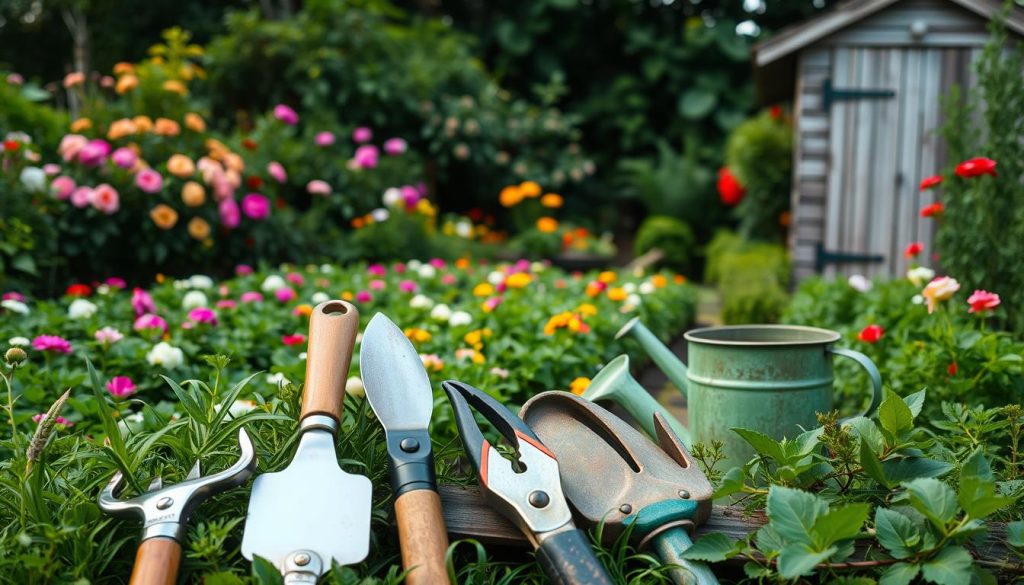
Knowing your garden’s size helps you buy the right tools. This way, you avoid buying too much and make sure you have what you need.
Small Garden Essentials
Small gardens need tools that are small and do many things. Look for hand tools that save space:
- Compact hand trowel
- Lightweight pruning shears
- Narrow hand rake
- Small watering can
Medium Garden Must-Haves
Medium gardens need a mix of tools. Add some power tools to your hand tools:
- Electric mini-tiller
- Cordless hedge trimmer
- Expandable garden hose
- Ergonomic long-handled tools
Large Garden Equipment
Big gardens need strong tools to handle more work. Get tools that can handle big jobs:
- Gas-powered tiller
- Professional-grade pruning tools
- Riding lawn mower
- Powerful leaf blower
Quality is more important than how many tools you have. Pick tools that fit your garden and your gardening style.
Maintaining Your Gardening Tools
Keeping your garden tools in good shape is key to their long life and performance. Well-cared-for tools can last for many years. This saves you money and makes gardening more fun and efficient.
Tools need regular care to avoid rust, stay sharp, and work well. If you ignore them, they might not work as well and could harm your plants.
Cleaning Tips for Durability
Cleaning your tools right after use is very important. Here’s how to do it:
- Get rid of dirt and plant bits right away
- Wash with warm water and gentle soap
- Make sure they’re dry to stop rust
- Put them away in a dry, safe spot
Sharpening Your Tools: Importance and Techniques
Sharp tools make gardening easier and protect your plants. Sharpening them often keeps them cutting well and saves your energy.
- Sharpen pruning shears and cutters with a file or stone
- Sharpen at a steady angle
- Oil metal parts lightly after sharpening
- Check for wear on tool edges often
By taking the time to care for your tools, you’ll keep them in great shape. This means they’ll work well for many seasons.
Ergonomics in Gardening Tools
Gardening can be tough on your body, but the right tools can help. Ergonomic gardening tools are made to ease the strain. They make gardening fun for everyone, no matter their age or fitness level.
Understanding Ergonomic Design
Ergonomic gardening supplies are designed to fit your body’s natural movements. They help reduce the physical stress of gardening. This prevents injuries and keeps you from getting tired too quickly.
Key Benefits of Ergonomic Tools
- Reduced muscle strain and joint stress
- Increased comfort during long gardening sessions
- Lower risk of repetitive motion injuries
- Improved overall gardening experience
Top Ergonomic Tool Recommendations
When choosing gardening tools, look for these ergonomic features:
- Padded handles with soft grip materials
- Angled handles to reduce wrist strain
- Lightweight designs for easier handling
- Adjustable length tools to accommodate different body types
Choosing ergonomic plant care tools can change your gardening for the better. They make gardening more comfortable and enjoyable. By using tools that support your body, you’ll garden with less pain and more joy.
Eco-Friendly Gardening Tools
Green gardening has changed the world of outdoor gardening tools. Today, gardeners look for tools that are good for the planet. They want tools that help their gardens grow well without harming the environment.
Sustainable gardening tools are a big change in garden care. These tools aim to reduce harm to the environment. They do this without losing any of the important work they do.
Biodegradable Gardening Options
Biodegradable gardening tools are great for those who care about the planet:
- They’re made from natural materials like bamboo and recycled plastics.
- They break down naturally when they’re no longer needed.
- They help reduce waste in landfills.
- They keep gardens safe from harmful chemicals.
Battery-Powered Tools: Efficient and Green
Battery-powered landscaping tools are a smart choice. They’re better for the environment than old gas-powered tools. Here’s why:
- They don’t release any direct emissions.
- They make less noise, which is good for everyone.
- They need less upkeep, saving time and effort.
- They use energy more efficiently.
Choosing eco-friendly gardening supplies makes gardens better for the planet. It also supports efforts to protect our environment. Today, gardeners can find tools that work well and are kind to the Earth.
Budgeting for Gardening Tools
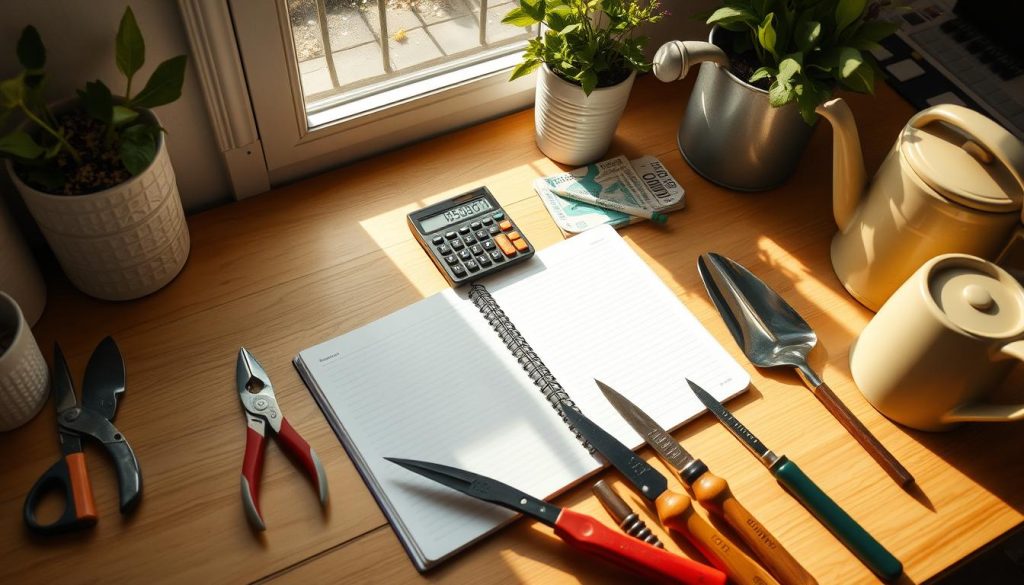
Creating a smart budget for gardening equipment is all about planning and investing wisely. You don’t have to spend a lot to get the right tools. Knowing how to use your money can greatly improve your gardening experience.
Here are some key strategies for buying garden tools:
- Start with core essential gardening tools that serve multiple purposes
- Prioritize quality over quantity
- Research price points across different retailers
- Look for seasonal sales and discounts
Cost-Effective Options
There are many ways to get gardening tools without spending a lot. Try community garden exchanges, second-hand stores, and online marketplaces for deals. Also, check local nurseries for end-of-season sales to save on essential equipment.
Investing in Quality vs. Quantity
Buying fewer, high-quality tools is smarter than many cheap ones. Even though they cost more upfront, they save money in the long run. Choose durable tools like pruning shears, trowels, and cultivators that last longer.
- High-quality tools last longer
- Reduced maintenance costs
- Better performance
- Ergonomic design benefits
By choosing and caring for your tools wisely, you can build a reliable set without spending too much.
Seasonal Gardening Tools
Gardening changes with the seasons, needing different tools for each time. Knowing which tools to use when can make gardening better and keep your garden healthy.
Spring Planting Tools
Spring is when gardening starts, needing special tools for getting the soil ready and planting. Important spring tools include:
- Trowels for placing seeds and seedlings just right
- Soil testing kits to check nutrient levels
- Hand cultivators for loosening tight soil
- Seed spreaders for even planting
Summer Maintenance Strategies
Summer is when keeping your garden healthy and growing is key. Important summer tools are:
- Pruning shears for keeping plants healthy
- Watering systems and sprinklers
- Weeding tools to stop unwanted plants
- Handheld sprayers for pests and diseases
Fall Cleanup Essentials
When it gets colder, gardeners need special tools for winter prep. Good fall tools are:
- Leaf rakes for quick yard cleanups
- Pruning saws for trimming plants when they’re not growing
- Composting tools for managing organic waste
- Winterizing sprinklers and irrigation systems
Using the right tools for each season helps keep your garden looking great all year.
Resources for Finding Quality Gardening Tools
Finding the right gardening tools can change how you garden. Gardeners have many ways to get the tools they need. Knowing where to shop helps you get the best tools without spending too much.
Local Garden Centers: Hands-On Shopping Experience
Local garden centers are great for seeing tools up close. You can:
- Check the quality of tools
- Get advice from experts
- Get tools that fit your needs
- Support local businesses
Online Retailers: Convenience and Selection
Online stores have a huge selection of gardening tools. They offer:
- A wide range of products
- Good prices
- Delivery right to your door
- Reviews from other customers
Second-Hand Options: Budget-Friendly Alternatives
Looking for second-hand tools can be smart. You can find them online, at yard sales, or in tool exchange groups. Just make sure to check if they’re in good shape.
Choosing where to buy depends on what you like, your budget, and your gardening needs. Each way has its own benefits for creating the perfect gardening set.
Conclusion: Building Your Gardening Tool Kit
Starting a gardening tool collection is a journey. It begins with knowing what your garden needs. Every garden is unique, and so should your tools.
Begin with basic tools like a good trowel, sharp shears, and strong gloves. These are the basics for your gardening adventures.
As you get better, your tool collection will grow. Beginners should look for tools that can do many things. Quality is more important than how many tools you have.
Choose tools that are easy on your body. Think about your garden’s size, your strength, and the plants you want to grow.
Your gardening journey is personal and keeps changing. Start with the basics and add more as you learn. Look for deals at local stores, online, or second-hand to save money. Each tool is an investment in your garden and your success.
Tailoring Your Toolkit to Your Needs
Good gardening means choosing the right tools for your garden. Gardens in cities need different tools than those in the countryside. Listen to what your garden needs and pick tools that help you care for it well.
Getting Started with Essential Tools
Building your gardening toolkit is a learning journey. Be patient, do your research, and get hands-on experience. Start simple, stay curious, and watch your garden and toolkit grow.
